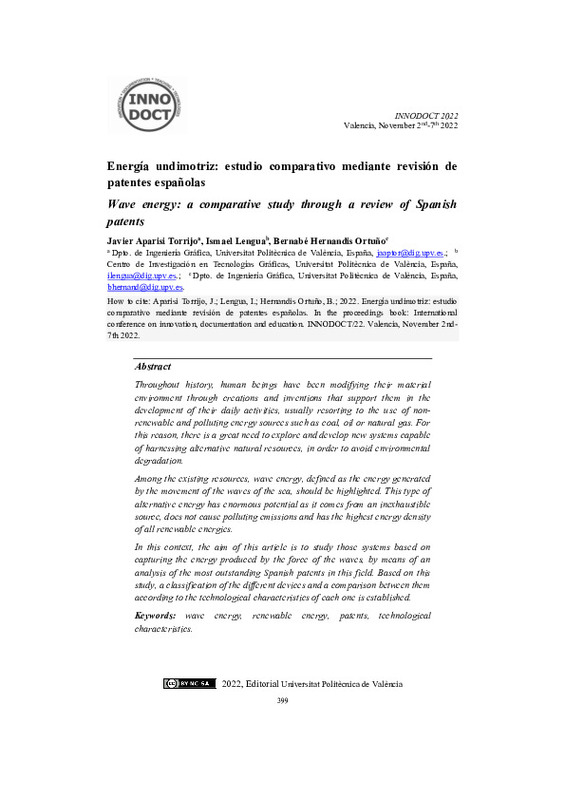JavaScript is disabled for your browser. Some features of this site may not work without it.
Buscar en RiuNet
Listar
Mi cuenta
Estadísticas
Ayuda RiuNet
Admin. UPV
Energía undimotriz: estudio comparativo mediante revisión de patentes españolas
Mostrar el registro completo del ítem
Aparisi Torrijo, J.; Lengua Lengua, I.; Hernandis Ortuño, B. (2023). Energía undimotriz: estudio comparativo mediante revisión de patentes españolas. En Proceedings INNODOCT/22. International Conference on Innovation, Documentation and Education. Editorial Universitat Politècnica de València. 399-400. http://hdl.handle.net/10251/193375
Por favor, use este identificador para citar o enlazar este ítem: http://hdl.handle.net/10251/193375
Ficheros en el ítem
Metadatos del ítem
| Título: | Energía undimotriz: estudio comparativo mediante revisión de patentes españolas | |
| Autor: | ||
| Entidad UPV: |
|
|
| Fecha difusión: |
|
|
| Resumen: |
[ES] A lo largo de la historia, el ser humano ha ido modificando su entorno material a través de creaciones e invenciones que le apoyen en el desarrollo de sus actividades cotidianas, recurriendo habitualmente al uso de ...[+]
[EN] Throughout history, human beings have been modifying their material environment through creations and inventions that support them in the development of their daily activities, usually resorting to the use of non-renewable ...[+]
|
|
| Palabras clave: |
|
|
| Derechos de uso: | Reconocimiento - No comercial - Compartir igual (by-nc-sa) | |
| ISBN: |
|
|
| Fuente: |
|
|
| Editorial: |
|
|
| Versión del editor: | http://ocs.editorial.upv.es/index.php/INNODOCT/INN2022/paper/view/15767 | |
| Título del congreso: |
|
|
| Lugar del congreso: |
|
|
| Fecha congreso: |
|
|
| Tipo: |
|







